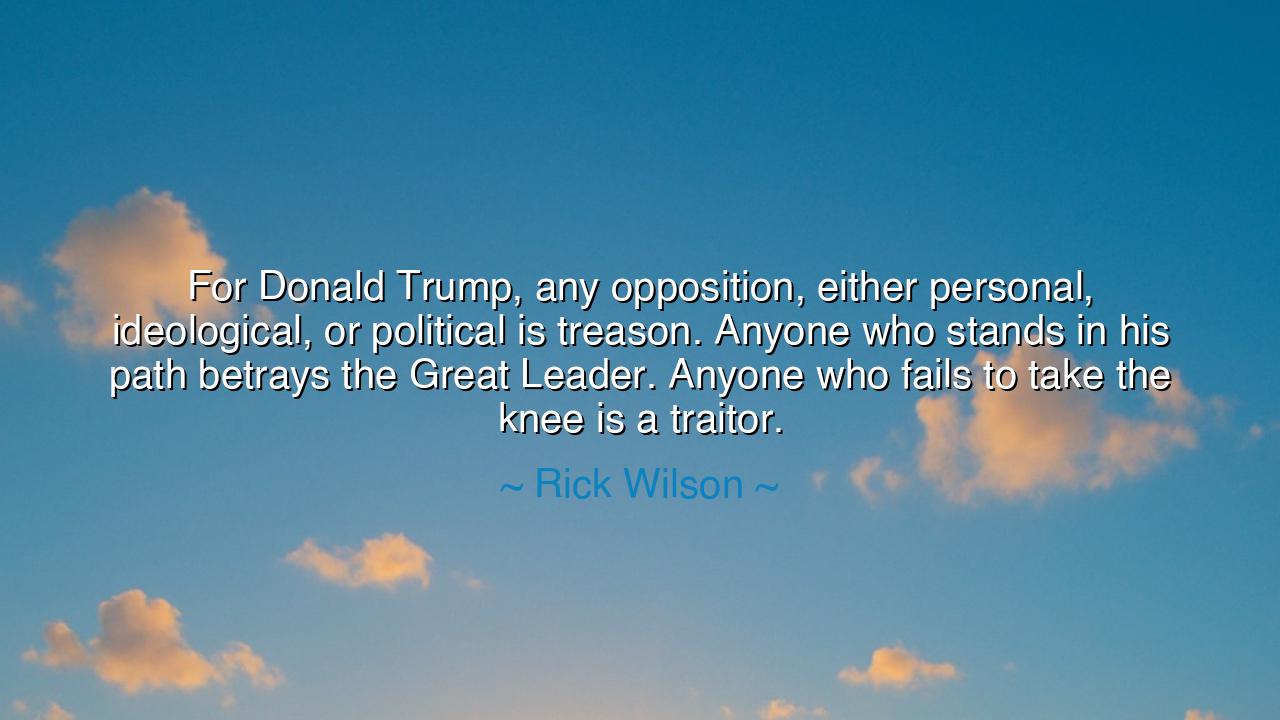
For Donald Trump, any opposition, either personal, ideological
For Donald Trump, any opposition, either personal, ideological, or political is treason. Anyone who stands in his path betrays the Great Leader. Anyone who fails to take the knee is a traitor.






“For Donald Trump, any opposition, either personal, ideological, or political, is treason. Anyone who stands in his path betrays the Great Leader. Anyone who fails to take the knee is a traitor.” Thus spoke Rick Wilson, a man once of the same political tribe, yet later a fierce critic of the very power he helped to shape. In these words he does not merely describe a man, but warns of a spirit — the spirit of tyranny that cloaks itself in glory and demands worship instead of respect. His quote is a lament and a warning: that when a leader confuses loyalty to the nation with loyalty to himself, when he brands disagreement as betrayal, then the seed of despotism has already taken root in the soil of freedom.
The origin of these words lies in the turmoil of modern America, spoken by Wilson, a strategist turned reformer, who watched with dismay as political discourse gave way to cult-like obedience. He saw the rise of a rhetoric that equated criticism with enmity, and questioning with disloyalty. What Wilson described was not new, for history has long known such men — rulers who mistake power for virtue and obedience for love. From the courts of kings to the parliaments of republics, the story is the same: when a leader demands kneeling instead of reasoning, the people have already begun to lose their freedom.
To understand the meaning of Wilson’s warning, we must look to the heart of power itself. The noble leader welcomes dissent, for dissent sharpens wisdom and purifies vision. The tyrant, however, fears it, for dissent exposes his fragility. Thus he calls it treason, to silence those who see too clearly. He builds his throne not upon truth, but upon fear, and his followers, rather than citizens, become subjects. It is not loyalty to the nation he seeks, but submission to himself. And when a people accept such submission, they cease to be free; they become mirrors reflecting only the image of their master.
This is not a tale of one man or one time. It is a pattern repeated through the centuries. Consider the fate of Louis XIV, the Sun King of France, who declared, “L’état, c’est moi” — “I am the state.” His power seemed absolute, yet in his shadow the seeds of revolution grew. When kings mistake their will for law and their image for truth, they sow the storm that one day destroys them. Or recall Joseph Stalin, who demanded worship from his people and declared any who questioned him to be enemies of the state. In his paranoia, millions perished, and the land groaned beneath the weight of false devotion. The path from pride to tyranny is ever the same — it begins when a leader believes that opposition is not disagreement, but treachery.
Wilson’s words also hold a mirror to the age we live in — an age where ideological zeal often replaces civic virtue, and where partisanship drowns out principle. The danger is not confined to one leader or one nation. It lies within the heart of every movement that exalts a man above the ideals he claims to serve. When politics becomes worship, and criticism becomes heresy, democracy withers. The people, weary of complexity, turn to the false comfort of certainty — to the strong voice that promises greatness while demanding silence. Yet a free people must never kneel, for liberty cannot coexist with blind obedience.
There is, however, hope within the warning. For as history shows, the power that demands worship eventually destroys itself. Truth, though silenced, rises again; conscience, though suppressed, cannot be extinguished. The prophets of freedom — from Socrates to Martin Luther King Jr. — have always been branded traitors in their own time, yet their words outlived their persecutors. The lesson, then, is eternal: it is not treason to question power; it is treason to the human spirit to remain silent before falsehood.
Therefore, O seeker of wisdom, remember this: when you hear a leader call his critics enemies, when you see a movement that demands unthinking devotion, beware. Love your nation enough to challenge it. Honor truth enough to defend it, even when it costs you peace. True patriotism is not kneeling to a man, but standing for principle. The Great Leader passes away; the great idea endures. And as long as even one voice dares to speak truth to power, freedom still lives.
Let Wilson’s words echo through your heart as both warning and call: resist the seduction of idols in human form. Speak not in flattery, but in honesty. Stand not in fear, but in courage. For the measure of a people is not in how they serve their rulers, but in how they hold them accountable. Thus is liberty preserved — not by silence, but by the eternal conversation between power and conscience, between the throne and the truth.






AAdministratorAdministrator
Welcome, honored guests. Please leave a comment, we will respond soon